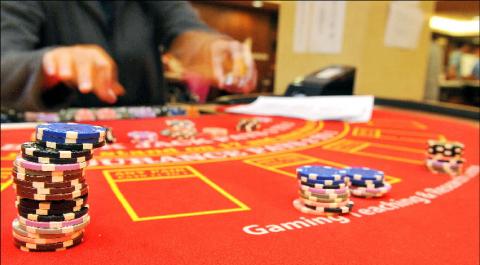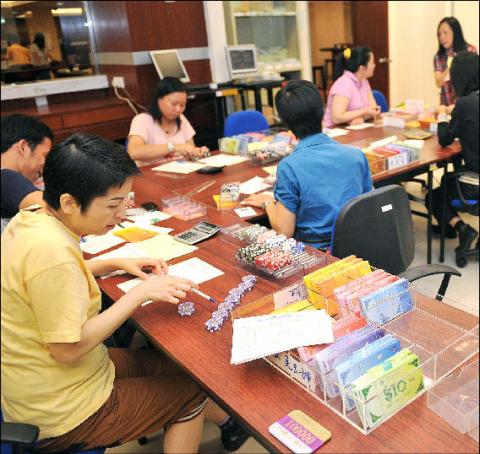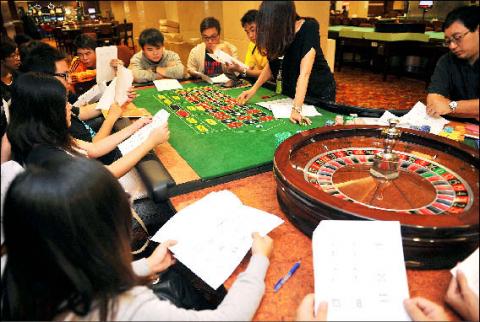In a big, garishly decorated room, dealers deftly lay out cards for baccarat, while an eager crowd watches a roulette wheel spin. However, the money changing hands is fake, while the punters are scribbling down notes on casino mathematics, because this is not a casino, but a classroom.
Thousands of students aged from 18 upward pass through the mock casino run by the Macau Polytechnic Institute each year, training to work in the enormous gambling venues that dominate the world’s biggest gaming city.
As the sector balloons, young locals hold the aces in the job market: With the law giving them priority, they are almost guaranteed a job in gaming if they want one.

Photo: AFP
This is where they come to learn how to deal smoothly, calculate chips in a split second and deal with the bad losers; to pass exams in baccarat, blackjack and Texas hold ’em.
“We used to earn bad salaries — now we earn more and are no longer afraid of finding ourselves without a job,” said student Derek Kwok, 30, who is retraining as a dealer after working in hotels for 10 years.
He has witnessed the gaming sector’s extraordinary growth since licensing was opened up to foreign competition in the early 2000s and wants to be part of that boom. Last year the sector grew by 57 percent.

Photo: AFP
Kwok is one of more than 6,600 students taking vocational courses in gaming at the polytechnic this year, another sign of the speed of expansion in an industry that currently employs about 43,000, or 13.5 percent of the workforce, and indirectly provides work to many more.
The mock casino is laid out as an entire gaming floor, complete with cash office and multicolored carpet, and students take turns to play the parts of gamblers and staff.
The lion’s share of students are learning to work as dealers, but the polytechnic also offers courses in cash management, slot machines and surveillance, while it has recently started offering a degree program for those aiming for higher management.

Photo: AFP
Most of the courses are brief and the salaries on graduation good: Dealers start at more than 10,000 patacas (US$1,280) a month, said trainer Lucy Ki. Unemployment for June to August this year in Macau was just 2.6 percent.
However, those who already work in the industry and are back at the polytechnic to further their skills, say there are more difficult lessons to be learned in the new Macau.
Yoki Leung, 28, is studying on the degree course and works as a dealer, but her real interests are more sedate. She hates working shifts in a 24-hour casino and would prefer to work in government while studying cooking and flower arranging on the side.
Leung said she wishes gaming licenses had not been opened up.
“Everyone was happy in the past, when earning a monthly salary of 10,000 patacas was plenty. Now everyone agrees that the gambling jobs are the best in the city and yet even with them, you can’t afford a flat,” she said.
Her fellow students also cite inflation, social problems and the burden of working nights. The courses include advice on gambling addiction, to which dealers as well as punters can succumb.
And others speak of the strange effect of seeing huge amounts of money won and lost every day.
Mandi Ieong, a degree student aged 20, works as a host on high-roller junket trips that bring in VIP gamblers from Thailand, Japan and South Korea. She has become adept at dealing with demands from gamers to borrow more money once their millions run out.
“I have seen them win 10 million [patacas] and I have seen them lose 10 million, so I am not excited and I am not disappointed when I watch,” she said.
Ieong is not interested in gambling herself.
“All of my friends, we have realized that if you gamble for a long time, you will lose everything. All my classmates, we are studying this, we know that there’s actually nothing to win,” she said.
However, grateful for the prosperity that gaming has brought, Ieong brushes aside her family’s concerns about the antisocial hours and her own skepticism about gambling.
“I’m young, I’m still just trying things out,” she said.
Professor Zeng Zhonglu, who researches the economics of gambling at the institute, said workers in the industry can afford to be carefree for the next five to six years, as the eye-popping growth is set to continue.
However, then it will slow as the sector matures, he predicts, based on surveys of the gamblers who visit Macau. Meanwhile, locals will continue to battle inflation and threats to their living standards.
Questions remain over the future of those now entering the industry as dealers, who some casinos will reject later as too old for the quick calculations the role requires.
Meanwhile, Zeng said, young people are becoming complacent, with many failing to carry on their education because so many jobs are available with minimal training.
He urged both individuals and Macau as a whole to prepare for the future change of pace.
“It is not possible for the industry to keep growing forever,” Zeng said.
Alex Lo, 35, coordinates training on slot machines at the mock casino and is proud that this is the only such training course in Asia.
He has thrown himself into the field with zest, campaigning for better industry standards and comparing Macau’s slot technology avidly with that elsewhere.
However, like many in the mock casino, he laughed when asked what he thinks of gamblers and said: “They can’t control themselves.”
And on whether he enjoys working in the industry, Lo — who first trained as an electrical engineer — simply said: “There’s no other choices.”

Intel Corp chief executive officer Lip-Bu Tan (陳立武) is expected to meet with Taiwanese suppliers next month in conjunction with the opening of the Computex Taipei trade show, supply chain sources said on Monday. The visit, the first for Tan to Taiwan since assuming his new post last month, would be aimed at enhancing Intel’s ties with suppliers in Taiwan as he attempts to help turn around the struggling US chipmaker, the sources said. Tan is to hold a banquet to celebrate Intel’s 40-year presence in Taiwan before Computex opens on May 20 and invite dozens of Taiwanese suppliers to exchange views

Application-specific integrated circuit designer Faraday Technology Corp (智原) yesterday said that although revenue this quarter would decline 30 percent from last quarter, it retained its full-year forecast of revenue growth of 100 percent. The company attributed the quarterly drop to a slowdown in customers’ production of chips using Faraday’s advanced packaging technology. The company is still confident about its revenue growth this year, given its strong “design-win” — or the projects it won to help customers design their chips, Faraday president Steve Wang (王國雍) told an online earnings conference. “The design-win this year is better than we expected. We believe we will win

Chizuko Kimura has become the first female sushi chef in the world to win a Michelin star, fulfilling a promise she made to her dying husband to continue his legacy. The 54-year-old Japanese chef regained the Michelin star her late husband, Shunei Kimura, won three years ago for their Sushi Shunei restaurant in Paris. For Shunei Kimura, the star was a dream come true. However, the joy was short-lived. He died from cancer just three months later in June 2022. He was 65. The following year, the restaurant in the heart of Montmartre lost its star rating. Chizuko Kimura insisted that the new star is still down

While China’s leaders use their economic and political might to fight US President Donald Trump’s trade war “to the end,” its army of social media soldiers are embarking on a more humorous campaign online. Trump’s tariff blitz has seen Washington and Beijing impose eye-watering duties on imports from the other, fanning a standoff between the economic superpowers that has sparked global recession fears and sent markets into a tailspin. Trump says his policy is a response to years of being “ripped off” by other countries and aims to bring manufacturing to the US, forcing companies to employ US workers. However, China’s online warriors